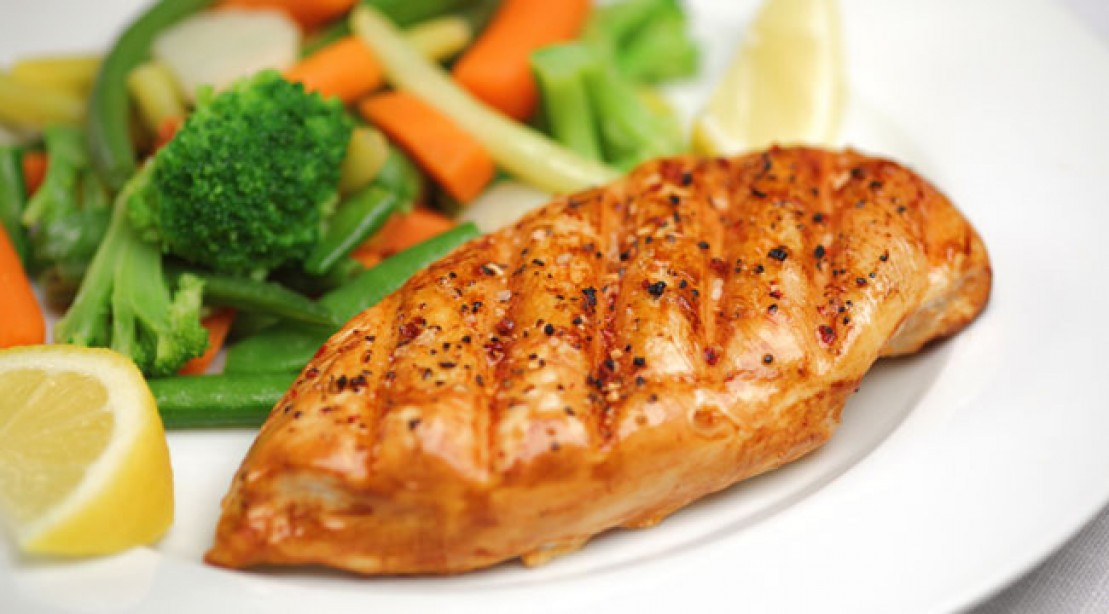 8 Nutrition Rules For Building Maximum Muscle
8 Nutrition Rules For Building Maximum Muscle
No more confusion! Learn what to put in your body for greater size.
Training to build muscle isn’t too hard to wrap your head around. A caveman could probably stumble into a gym and figure out that lifting those big hunks of metal leads to bigger muscles.
Nutrition for building serious muscle becomes more complicated stuff. Sure, ample nutrients are needed to support muscle growth. We all know that much. But muscle builders are barraged with enough diets, strategies, foods, and terminology to confuse Albert Einstein, let alone a caveman.
Who to believe? Well, me, and not just because I did graduate work at Yale en route to my Ph.D. Rather, believe me because I applied the following 8 nutrition rules for building muscle to my own physique with great results. Consider them both lab-tested and “Jim”/gym-tested:
Rule #1: Calories Are King
The first thing to focus on is supplying your body with plenty of calories. If you don’t consume enough of them, your body can’t expend energy growing. That means NO gains. So on workout days, aim to consume 20-to-22 calories per pound of body weight for the day. On non-training days, reign in the calories just a bit, since you won’t be expending as many. Cut your intake down to about 18 calories per pound of body weight.
That’ll help to keep your mass gain on the muscle side, not the fat side.
Rule #2: Two-Time(s) Your Protein
Since muscle is made from protein, it makes perfect sense that in order to grow, you need to eat a lot of protein. How much is a lot? Way more than the standard 1 gram of protein per pound of body weight. Try upping it to 2 grams per pound of body weight on both training and rest days. You’re better off eating too much protein rather than not enough. As far as sources go, you’ll want plenty of whey and casein protein powder, but also lots of whole-foods protein sources such as eggs, beef, chicken, fish, and dairy.
Heavy weight and tons of reps are a waste of time without protein. A convenient, quick, and wallet-friendly protein supplement is the perfect muscle BANG for your buck, so don’t shoot yourself in the foot by missing out.
Rule #3: Eggs Are Excellent For Muscle Growth
When it comes to protein, there are certain types you need to include in your diet, and eggs are definitely one of them. Eat at least 3 whole eggs and 3 egg whites per day to gain significant muscle mass. And if you’re worried about the cholesterol, don’t. Cholesterol from egg yolks won’t raise your LDL (bad cholesterol) levels.

So small, yet so full of protein.
Rule #4: Follow The Whey Awesome Strategy
Whey protein – you hear it all the time in the muscle-building realm. But what’s important is how you use it. First off, as a rule of thumb, start your morning with a whey protein shake. After sleeping for eight hours (hopefully), your body is in a catabolic state as a result of your brain needing glucose from your muscles during an extended nighttime fasting.
That means your muscle is being broken down for fuel. Breaking down muscle for glucose is the most efficient way for your brain to acquire what it needs, but it isn’t congruent with building muscle.
Shy away from eggs or other whole food protein sources in the morning, because they will digest too slowly! Have a whey protein shake with 20-to-40 grams of protein and some fruit for good morning carbs and glucose. About 30-to-60 minutes after this first breakfast, have a second breakfast of slower-digesting whole foods, such as eggs and oatmeal.
Whey Protein
What do we want? PROTEIN! When do we want it? NOW! When you need it and you need it now, whey protein is one of the fastest absorbing lean muscle proteins on the block.
It’s now commonly known that the small window preceding and following a workout is a crucial time for getting important nutrients into your body. In fact, a 2006 Victoria University study published in Medicine & Science in Sports & Exercise showed that weight-training men who consumed a shake containing protein, carbs, and creatine immediately before and after their workouts for 10 weeks gained almost twice as much muscle mass as men who took the same shake before breakfast and before bed.
The 30 minutes before and after a workout is your protein window, and whey is the fastest-absorbing protein. For best results, I suggest consuming 20 grams of whey protein along with carbs and creatine before your workout.
Immediately afterward, mix 20-to-40 grams of whey protein with 10-to-20 grams of casein, for some fast- and slow-absorbing protein fortification.
Rule #5: Use Carbohydrates Wisely
Carbs are extremely important when trying to build serious size. Your body needs to know you have an energy surplus to grow muscle efficiently. Stocking up with glycogen (the storage form of carbs) signals that your body has an energy surplus, turning on your anabolic switch. Plus, glycogen pulls water into the muscles, making them fuller. Glycogen also supports the stretching of muscle fiber membranes, which results in more complete growth and better long-term results.
On workout days, consume 2-to-3 grams of carbs per pound of body weight. And on rest days, drop your carbs to 1-to-1.5 grams, since you won’t be burning up carbs in the gym.
Timing carb consumption relative to your workouts is important as well. Within 30 minutes of the start of your workout, along with your whey shake, consume 20-to-40 grams of slow-digesting carbs such as oatmeal or whole-wheat bread. Slow-digesting carbs provide longer-lasting energy than fast carbs do. Plus, they don’t spike your insulin levels.

No energy crashes or insulin spikes for this smart fella!
Within 30 minutes after the workout, along with your protein shake, you’ll want to consume another 40-to-100 grams of carbs. This time, however, you want fast-digesting carbs such as white bread, Vitargo S2, sorbet, or fat-free candy. The spike these carbs cause in insulin levels not only helps to quickly replenish muscle glycogen, but it also boosts protein synthesis and blunts cortisol levels.
My favorite form of post-workout carbs is candy that uses dextrose as the main ingredient. Examples include Wonka Pixy Stix, Wonka Bottle Caps, and Wonka Sweet Tarts. Dextrose is basically glucose, the form of sugar your body uses. That means when you eat candy made of dextrose, your body doesn’t have to digest it. Instead, it absorbs immediately into your blood stream and heads straight to your muscles.
Rule #6: Don’t Shortchange Your Fat Intake
This doesn’t mean turning your body into a tub of lard; it means eating plenty of fat. Guys need fat, even saturated fat, to maximize natural levels of testosterone. Monounsaturated fat is especially important for maintaining testosterone levels and enhancing overall health.
The essential omega-3 fats found in fatty fish encourage better muscle and joint recovery.
For your fat intake, consume 1/2 gram of fat per pound of body weight per day. One-third of that should be saturated, 1/3 should be monounstaurated fat, and the other 1/3 should be omega-3 polyunsaturated fats.
Rule #7: Beef Up For Maximum Gains
Yep, beef is also an important protein source. In addition to providing quality protein, beef’s saturated fat is great for supporting healthy testosterone levels and maximizing muscle growth. Beef is also rich in B vitamins, zinc, and iron – benchmark nutrients for growing muscle and maintaining energy levels during training.

Now you know WHY beef is what’s for dinner.
Rule #8: Slow Things Down With Casein
Remember how your brain selfishly burns muscle to fuel itself when you sleep? Well, the best way to avoid that is by having some slow-digesting casein before bed.
Casein constitutes the majority of the protein in milk, and forms micelles when mixed with fluid. These micelles behave like an onion–each protein layer gets peeled off and digested one at a time, providing your body with a steady stream of aminos for about 7 hours. That prevents your body from using muscle aminos–phew! The best casein protein powder is one that contains micellar casein. If you prefer a food source, a cup or so of cottage cheese will work well.
Author:
Jim Stoppani
